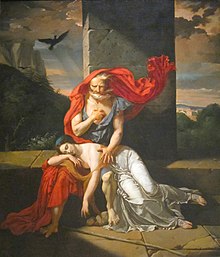Oedipus on Colonus
Oedipus on Kolonos ( Greek Οἰδίπους ἐπὶ Κολωνῷ Oidipous epi Kolōnō ) is a 401 BC. Chr. The first time posthumously listed drama of the ancient Greek poet Sophocles . The material of the piece is taken from the so-called Theban sagas. In terms of content, it stands between the Sophocles dramas King Oedipus and Antigone , but does not form a separate tetralogy with these. Rather, it is the last Sophocles piece listed. The place of the action is Kolonos , a hill near Athens , on which the sanctuary of the Eumenids, forbidden for Oedipus , is located. However, the word also stands for the "burial mound". Today Kolonos is one of the districts of Athens .
Prehistory to the drama
The play Oedipus auf Kolonos is preceded by King Oedipus , the first and central part of the Oedipus mythology . Oedipus unwittingly slays his biological father, Laius , king of Thebes , and later frees Thebes from the Sphinx . For the salvation of the city he is from the temporary King Creon (Queen Iokastes voted brother and Oedipus' uncle) to the king and gets the widow Jocasta, his own mother, as a wife. He has four children with her: the male twins Eteocles and Polynices and the daughters Antigone and Ismene . After Iocaste and Oedipus learned many years later of the ominous fulfillment of the oracle prophecy and thus of their true identity, Iocaste hanged himself, whereupon Oedipus took his eyesight, but left his death to the will of the gods. He banishes himself from Thebes and gives his children to Creon.
content
After years of exile, the aged Oedipus appears in the presence of his daughter Antigone on the hill of Kolonos near Athens, on which the holy Eumenid grove is located. There he wants to ask for redemption from his painful life. Shortly after their arrival, their second daughter, Ismene, joins them to help their sister and father agree to favor the gods . Theseus , King of Athens, pity the afflicted and offers his hospitality.
Creon appears armed at Colonos and in turn offers Oedipus a conciliatory return to Thebes. Since Oedipus foresees the disastrous fate of Thebes and does not want to abandon his self-exile, he refuses to return home. Creon then kidnaps Antigone and Ismene, who, however, can be freed by Theseus shortly afterwards.
A little later, Oedipus' son Polynices appears and reports of his expulsion from Thebes by his brother Eteocles, who refuses to hand over the throne to Polynices after the end of his reign. He reports of the plan to defeat the seven gates of the city with his army and to recapture Thebes. He wants to help his father Oedipus back to the throne of Thebes, whose heir he would then be. Oedipus, however, curses the “very worst son” who never cared about his father. Oedipus was only able to survive through the care of his daughters. Instead, he prophesies to his sons that they will murder one another in the dispute over Thebes. Already at this point Polynices recognizes the seriousness of the curse and asks Antigone to bury him in the event of his death. When the thunderstorms and tremors arise that mark Oedipus' death according to the divine prophecy, he looks for a hidden resting place on the hill that only Theseus should know, so that the daughters, shaken by the death of their father, do not judge themselves and go to the grave with them.
After the death of Oedipus, the daughters return to Thebes, Antigone mainly to prevent their brothers from fighting. The later death of the sons and Antigone's promise by Kolonos to bury Polynices is the starting point for the third part of the Theban Antigone trilogy .
effect
Sophocles' trilogy of myths, to which Oedipus on Colonus belongs, already had a great impact in ancient Greece. With regard to dramaturgy , peripetia and anagnorisis , Aristotle describes the dramas of Sophocles as prime examples of tragedy . The writer Adolf Muschg describes Oedipus on Kolonos as the most exemplary work for European culture. It shows the conflict not resolved in the spirit of hospitality, but resolved. Sophocles' tragedy was translated into German by the Austrian writer Peter Handke in 2003.
Modern performances and arrangements
- 1986: Lee Breuer and Bob Telson: The Gospel at Colonus.
- 2010: In July 2010 Peter Stein performed the play as part of the Salzburg Festival on the Pernerinsel in Hallein with Klaus Maria Brandauer as Oedipus. This performance is shown by the Berliner Ensemble .
literature
- Manfred Krill : Oedipus' Ende, Sophocles (497/96 - 406 BC). Oedipus in Kolonos (Oidipous epi kolonō) - re-read psychoanalytically . Peter Lang, Frankfurt am Main et al. 2011, ISBN 978-3-631-61407-5 .
Web links
- sophokles OEDIPUS ON COLONOS - translation by DE Sattler
Individual evidence
- ^ Adolf Muschg : European cultural power. How does Europe use the opportunities of its cultural diversity? In: Kulturpolitische Mitteilungen . No. 118. III / 2007, pp. 29-33 .
- ↑ Cf. Andreas Dorschel , "That, father, is not a word doodle". Sophocles' “Oedipus in Colonus”, Peter Handke's transmission and the misery of his critics. In: Süddeutsche Zeitung , 127, June 4, 2003, p. 16.
